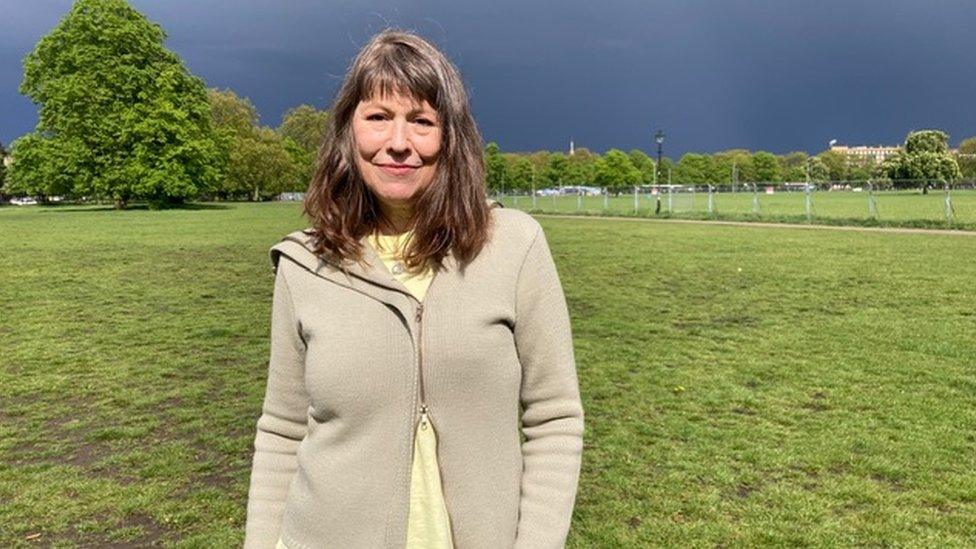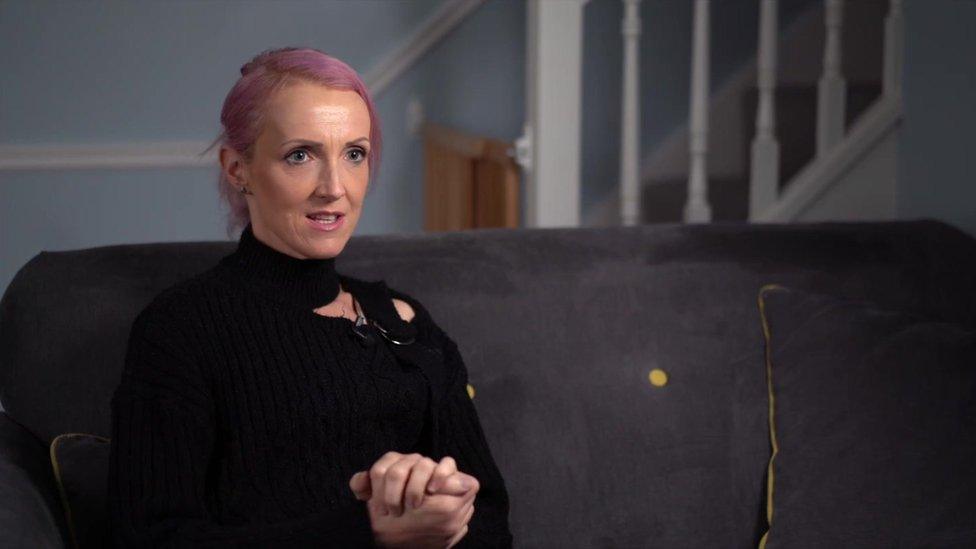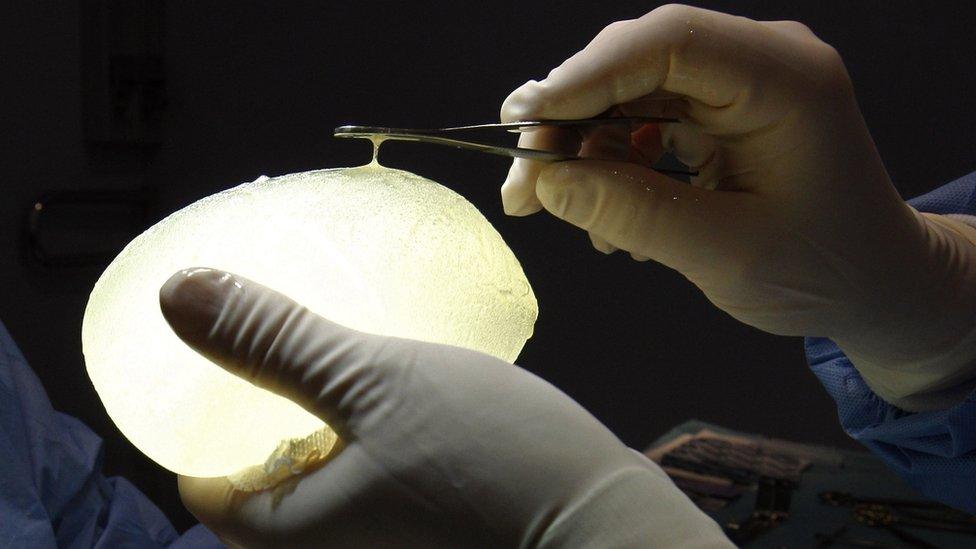PIP implant victims 'elated' by compensation win
- Published
Jan Spivey and Louise Smith, two of the women affected, were delighted by the court's decision
Thousands of women who were victims of the PIP breast implant scandal should receive compensation, a French appeal court has decided.
Women involved in the case say they are elated and exhausted after 10 years of fighting for justice.
The court also upheld an earlier judgement finding German safety body TUV Rheinland negligent.
TUV said it had acted "diligently", and that women must prove they had a PIP implant to be entitled to compensation.
It awarded safety certificates for faulty breast implants made by French company Poly Implant Prothèse (PIP).
The court decision could have far-reaching implications for thousands of other victims around the world.
Jan Spivey, one of 540 British women involved in the case, was given PIP implants after she had a mastectomy due to breast cancer.
After hearing the decision, she said she was "elated and exhausted".
"It's been a very long journey," she said.
"We've been in and out of court, and that's been really difficult for women. We've got health issues and we've got lots of other responsibilities too - PIP has had an impact on the whole of our lives.
"It's been an inescapable issue."
Jan developed aching joints, pain and fatigue after having the implants, and once they were removed it was clear they had been leaking silicone into her body.

Jan Spivey suffered years of health problems after having PIP breast implants
"My PIP implants from 20 years ago are still impacting on my life and my health and my wellbeing, even today," Jan said.
"I think I've been angry every single day for the 20 years I've been affected by PIP."
Unresolved cases
Olivier Aumaître, the lawyer representing Jan Spivey and around 2,700 others in the current case, said it was an historic day for the victims and for women's rights. He said the company would now have to fully compensate all the women judged to be victims.
"I'm very happy for all the women I represent who have waited for such a long time for this decision and suffered for such long periods," he said.
But many hundreds of women in the UK are still waiting for legal decisions on their cases and their right to compensation.
Oliver Thorn, lawyer with Slee Blackwell Solicitors, represents 500 women. He said many still had their breast implants in place because they did not have the money to get them replaced, and that was why they needed compensation.
"The cosmetic surgery industry as a whole needs to sit up and see what has gone on here and it's time things were changed," he said.
The president of The British Association of Aesthetic Plastic Surgeons Mary O'Brien said the UK medicines' regulator, the MHRA, had an important role in ensuring a similar scandal over implants never happened again.
"The human cost and distress to many women and their families following surgery involving PIP implants is sobering," she said.
Plastic surgeons supported the setting up of a breast implant registry to improve patient safety.
They advise patients to consult their surgeon if concerned about symptoms related to their implants and read all reliable sources of information before undergoing breast implant surgery for any reason.
'Amazing victory'
Another woman affected by the case, Nicola Mason - who had breast implants which then ruptured - said the court decision was "a victory, it's amazing".
"We've waited a long time for this," she told the Today programme on BBC Radio 4.
Nicola first found out about the rupture when she was pregnant, after noticing a large lump under her arm.
She said it was "quite traumatic and there was absolutely nothing I could do".
Eventually, the implants were removed but she says she has been left with a massive lump of silicone under her arm which still flares up.
"I don't think anyone knows the long-term effects," she says.
How safe are breast implants?
Cheap silicone
Between 2001 and 2010 the substandard implants were manufactured by the French company Poly Implant Prothèse or PIP.
It was liquidated in 2010 and its founder was later given a prison sentence after it emerged the implants were filled with cheap, industrial-grade silicone which was not cleared for human use.
It is estimated up to 400,000 women worldwide have received the illegal implants.
Latin America was worst hit, in particular Colombia, where there are estimated to be 60,000 victims. In the UK it is thought 47,000 women are affected.
The case, known as TUV1, was the first to be brought, a decade ago, against TUV Rheinland which issued European safety certificates for the PIP implants.
Lawyers for the German company said they disagreed with the French court's decision for holding the company liable, "even partly".
"The evidence in this case clearly shows that TÜV Rheinland acted diligently, in compliance with applicable regulations," they said.
At no time, the company said, had it been aware that breast implants manufactured by PIP were not compliant.
The ruling is expected to have wider implications for almost 20,000 other women, half of whom are British, who are taking similar legal action in France.

Alifie Jones had her implants removed last month
Alifie Jones is recovering at home after having her faulty PIP breast implants removed last month.
She was finally convinced by a friend to take them out after suffering years of extreme exhaustion and debilitating pain.
She says the worst thing about it was wondering why she felt so ill all the time: "Not knowing what it was, the mysterious illnesses, not being able to exercise. Not being vibrant, having my life, sort of stolen from me in a way."
The surgeon was shocked by what he found when he removed one of the implants. It had broken into multiple pieces inside her - exposing her body to an industrial-grade silicone gel.
"I can't believe they were allowed to be implanted in me. I don't know how they got through regulations.
"But I feel guilty that I messed about with my body and I put them in in the first place. But I'm angry that a human being can do that to another human being."

Did you receive a PIP implant? Share your experiences by emailing haveyoursay@bbc.co.uk, external.
Please include a contact number if you are willing to speak to a BBC journalist. You can also get in touch in the following ways:
WhatsApp: +44 7756 165803
Tweet: @BBC_HaveYourSay, external
Please read our terms & conditions and privacy policy

BRAND NEW DRAMA: Five friends are bound together by a fragile pact of silence...
MEDICINE AND LIFE EXPECTANCY: How the smallpox vaccine changed our world

If you are reading this page and can't see the form you will need to visit the mobile version of the BBC website to submit your question or comment or you can email us at HaveYourSay@bbc.co.uk, external. Please include your name, age and location with any submission.
Related topics
- Published20 January 2017
